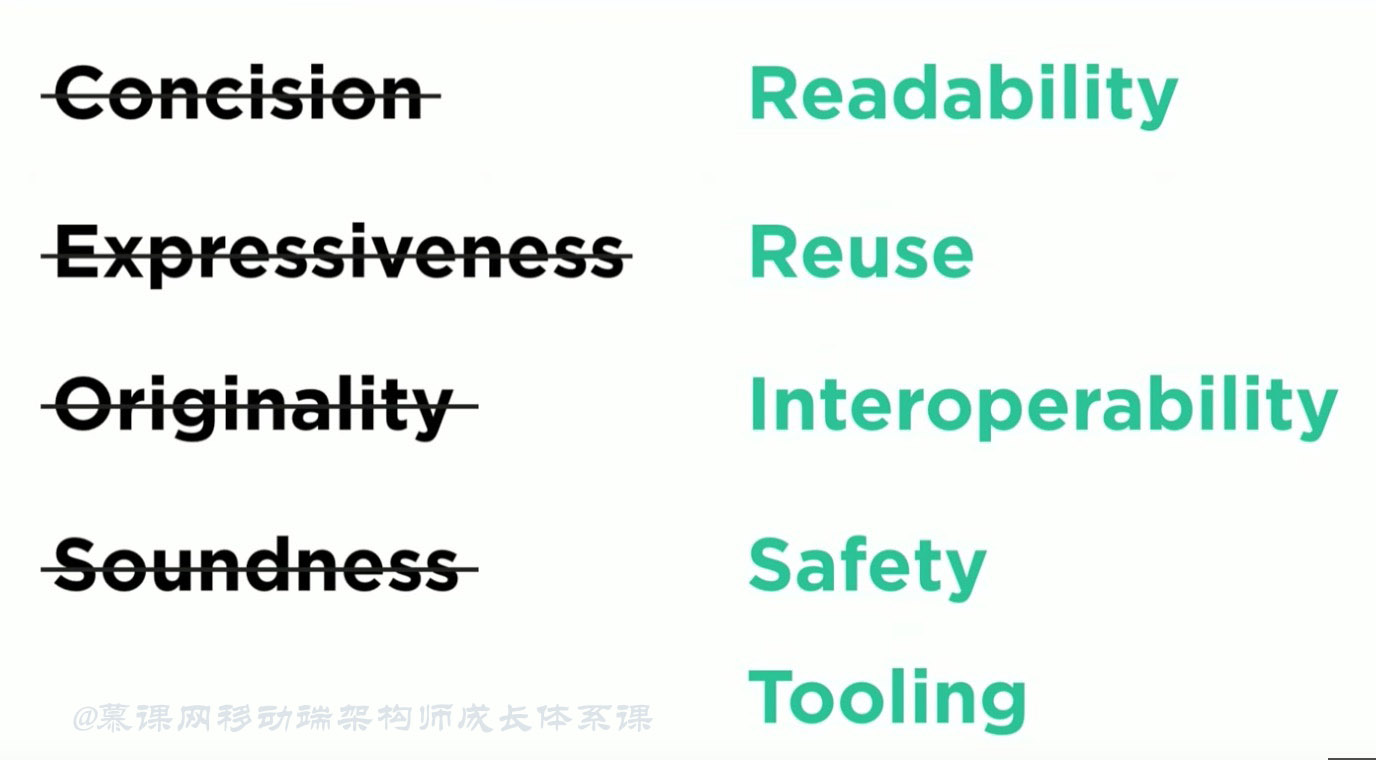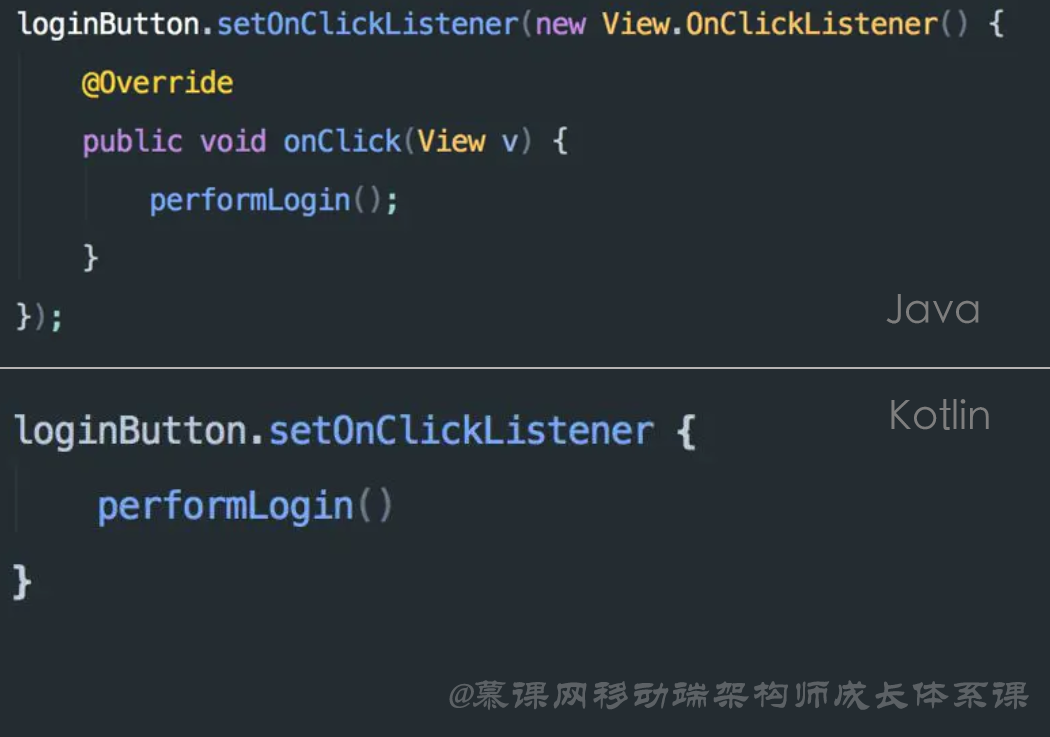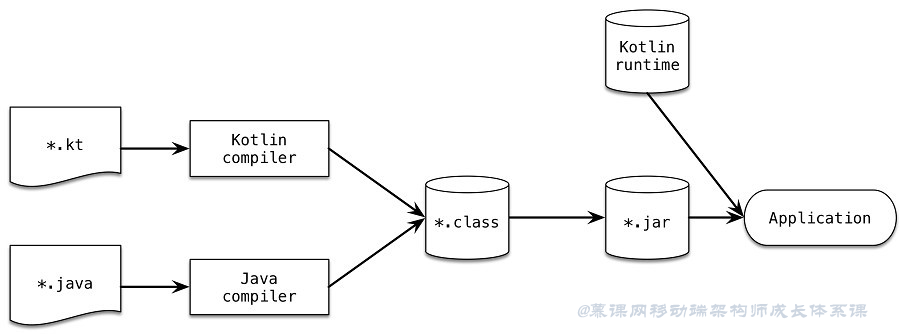Kotlin教程
以架构师角度认识Kotlin
为大家倾力打造的课程《移动端架构师成长体系课》上线了,带你从移动普通工程师到架构师全方位蜕变;全面掌握面向移动端未来的主流技术栈;从零开始亲自构建千万级电商项目,串联移动架构师成长各阶段。
目录
- Kotlin概述
- 学习Kotlin对架构师的意义
- Kotlin设计理念
- Kotlin构建流程
- 该如何有效的学习
- 作业:Kotlin与Java的异同
本文出自教程《移动端架构师成长体系课》——带你完成从普通工程师到架构师的蜕变。
Kotlin概述
Kotlin是一种在Java虚拟机上运行的静态类型编程语言。它主要是JetBrains开发团队所开发出来的编程语言。虽然Kotlin与Java语法并不兼容,但Kotlin被设计成可以和Java代码相互运作,并可以重复使用如Java集合框架等现有Java引用的方法库。它很容易在Android项目中替代Java或者同Java一起使用。
Google在2019年的Google I/O大会上宣布Kotlin被选为Android开发首选语言。
Kotlin的特点很多:
- 简洁易用: Kotlin中提供了大量的扩展,使得我们的代码更加简洁,开发出来的框架更加易用
- 安全: 避免空指针异常等整个类的错误
- 互操作性: 充分利用 JVM、Android 和浏览器的现有库
- 工具友好: 可用任何 Java IDE 或者使用命令行构建
学习Kotlin对架构师的意义Kotlin
那现在该不该学习Kotlin呢?以及学习Kotlin对架构师来说会有那些意义呢?
- 学习正当时:目前Kotlin已经成为Android开发的官方首选语言,现在学习Kotlin是正当时;
- 顺应潮流,为了未来:现在包括一二线在内的各大互联网公司都在往Kotlin上转,现在学习Kotlin不仅是顺应潮流,更是为了为了未来着想;
- 提升开发效率:在开发效率上Kotlin开发要比Java高很多;
- 带领团队进行技术革新:提升团队的对前沿技术的追求与提升团队技术氛围,满足小伙伴对(钱、成长、平台)中成长的追求;
Kotlin设计理念
上图是来在于Kotlin语言设计团队的老大Andrey Breslav在2018年KotlinConf的会议上的演讲,里面包含了他对Kotlin设计上的一些理念的介绍,感兴趣的同学可以在油管上搜一下这个视频的完整版。
- 视频:KotlinConf 2018 - Conference Opening Keynote by Andrey Breslav
在KotlinConf 2018大会上Andrey Breslav表示了Kotlin并没有独创一些当前没有或大众不太熟悉的设计理念,而是吸收了众多其他语言的精髓,并且提供强大的IDE支持,能真正方便开发者运用到实际项目之中。
- 不仅简洁而且可读性强:主要指的是Kotlin支持隐藏例如getter、setter等Java模板代码,并且有大量的标准库以及灵活的重载和扩展机制,来使代码变得更加直观;
上图是在设置控件点击事件时分别用Java和Kotlin实现的对比,可以看出Kotlin实现省去了一些模板代码,不仅看起来简洁而且能让开发者专注于具体逻辑的实现,可读性更强。
-
不仅富有表现力而且可复用性更强:Kotlin将一些常用的功能比如:Android的一些扩展等封装成库,以方便开发者使用,在复用性方面它比Java有过之而不及;
-
对互通性的追求要大于独创性:为什么这么说呢,在Kotlin发展的初期,很多人会觉得Kotlin无非就是从其它语言copy过来的,之说以这么觉得是因为你看像高阶函数,闭包,扩展,Lambda表达式等都不是Kotlin首创的,都是从现有的语言中
借鉴过来的;Kotlin的设计者的理念是不追求独创性,而是追求更好的互通性,Kotlin要想超越Java必须要实现和Java的互通(互操作性),而不是另起炉灶。 -
强大的工具支撑以NPE保护使健全性更强:大家都知道Kotlin是JetBrains的团队开发的,而JetBrains也是大名鼎鼎的IntelliJ IDEA的作者,而我们开发Android 所以的AS也是Google和而JetBrains合作的产物,可以说在工具方面AS 为Kotlin开发Android提供了包括编译器检查等强大的支持。
Kotlin构建流程
上图是Kotlin和Java的构建流程对比:
- *kt会被Kotlin编译器编程编译成.class的字节码文件,然后被归档成.jar,最后呢由各平台打包工具输出最终的原因程序
- 上图不难理解*kt最终会被编译成Java的字节码文件,那为什么在最后一步还需要一个Kotlin运行时呢?想必很多小伙伴对这块肯定会有所疑惑
- 这是因为,我们用Java来写的程序所有的实现都会有标准的Java类库来做支撑,比如:
java.lang.*,java.util.*,但Kotlin中的类库是不在标准的Java类库中的,所以,Kotlin应用程序需要在最后一步借助Kotlin运行时来支撑这些Java标准类库没有的实现。
- 这是因为,我们用Java来写的程序所有的实现都会有标准的Java类库来做支撑,比如:
该如何有效的学习
- 首先过一遍上述的
Kotlin与Java的异同对Kotlin中差异的部分有个印象 - 跟着本课程的Kotlin讲解学习一篇
- 善用工具(
君子生非异也,善假于物也)- 官方文档:https://kotlinlang.org/docs/reference/
- 终极工具:善用AS的
convert java file to kotlin file工具 - 懂你的Google
终极工具(Practice)
如果你遇到一些代码不知道该如何用Kotlin来实现的时候,不妨试试下面的工具:
public interface BrightnessListener {
String[] onViewBrightness(String... args);
}
通过如下步骤将上述Java文件转成Kotlin:
AS->Code->convert java file to kotlin file
或者将上述代码复制到kotlin文件中利用AS的自动转换功能进行转换:
interface BrightnessListener {
fun onViewBrightness(vararg args: String?): Array<String?>?
}
Kotlin可以理解为Java的语法糖,我们可以借助AS提供的工具来查看我们Kotlin代码的Java 模样,也就是说IDE 会将我们的Kotlin代码转成怎样的Java代码:
AS->Tools->Kotlin->Show kotln Bytecode
作业:Kotlin与Java的异同
打印日志
Java
System.out.print("hello world");
System.out.println("hello world");
Kotlin
print("hello world")
println("hello world")
定义变量与常量常
Java
String name = "hello world"; final String name = "hello world";
Kotlin
var name = "hello world" val name = "hello world"
null声明
Java
String otherName; otherName = null;
Kotlin
var otherName : String? otherName = null
空判断
Java
if (text != null) {
int length = text.length();
}
Kotlin
text?.let {
val length = text.length
}
// or simply
val length = text?.length
字符串拼接
Java
String firstName = "Android"; String lastName = "Architect"; String message = "My name is: " + firstName + " " + lastName;
Kotlin
val firstName = "Android" val lastName = "Architect" val message = "My name is: $firstName $lastName"
换行
Java
String text = "First Line\n" +
"Second Line\n" +
"Third Line";
Kotlin
val text = """
|First Line
|Second Line
|Third Line
""".trimMargin()
三元表达式
Java
String text = x > 5 ? "x > 5" : "x <= 5";
Kotlin
val text = if (x > 5)
"x > 5"
else "x <= 5"
操作符
java
final int andResult = a & b; final int orResult = a | b; final int xorResult = a ^ b; final int rightShift = a >> 2; final int leftShift = a << 2; final int unsignedRightShift = a >>> 2;
Kotlin
val andResult = a and b val orResult = a or b val xorResult = a xor b val rightShift = a shr 2 val leftShift = a shl 2 val unsignedRightShift = a ushr 2
类型判断和转换 (声明式)
Java
Car car = (Car) object;
Kotlin
var car = object as Car
类型判断和转换 (隐式)
Java
if (object instanceof Car) {
Car car = (Car) object;
}
Kotlin
if (object is Car) {
var car = object // 自动识别
}
多重条件
Java
if (score >= 0 && score <= 300) { }
Kotlin
if (score in 0..300) { }
更灵活的case语句
Java
int score = // some score;
String grade;
switch (score) {
case 10:
case 9:
grade = "Excellent";
break;
case 8:
case 7:
case 6:
grade = "Good";
break;
case 5:
case 4:
grade = "OK";
break;
case 3:
case 2:
case 1:
grade = "Fail";
break;
default:
grade = "Fail";
}
Kotlin
var score = // some score
var grade = when (score) {
9, 10 -> "Excellent"
in 6..8 -> "Good"
4, 5 -> "OK"
in 1..3 -> "Fail"
else -> "Fail"
}
for循环
Java
for (int i = 1; i <= 10 ; i++) { }
for (int i = 1; i < 10 ; i++) { }
for (int i = 10; i >= 0 ; i--) { }
for (int i = 1; i <= 10 ; i+=2) { }
for (int i = 10; i >= 0 ; i-=2) { }
for (String item : collection) { }
for (Map.Entry<String, String> entry: map.entrySet()) { }
Kotlin
for (i in 1..10) { }
for (i in 1 until 10) { }
for (i in 10 downTo 0) { }
for (i in 1..10 step 2) { }
for (i in 10 downTo 0 step 2) { }
for (item in collection) { }
for ((key, value) in map) { }
更方便的集合操作
Java
final List<Integer> listOfNumber = Arrays.asList(1, 2, 3, 4);
final Map<Integer, String> keyValue = new HashMap<Integer, String>();
map.put(1, "Android");
map.put(2, "Ali");
map.put(3, "Mindorks");
// Java 9
final List<Integer> listOfNumber = List.of(1, 2, 3, 4);
final Map<Integer, String> keyValue = Map.of(1, "Android",
2, "Ali",
3, "Mindorks");
Kotlin
val listOfNumber = listOf(1, 2, 3, 4)
val keyValue = mapOf(1 to "Android",
2 to "Ali",
3 to "Mindorks")
遍历
Java
// Java 7 and below
for (Car car : cars) {
System.out.println(car.speed);
}
// Java 8+
cars.forEach(car -> System.out.println(car.speed));
// Java 7 and below
for (Car car : cars) {
if (car.speed > 100) {
System.out.println(car.speed);
}
}
// Java 8+
cars.stream().filter(car -> car.speed > 100).forEach(car -> System.out.println(car.speed));
Kotlin
cars.forEach {
println(it.speed)
}
cars.filter { it.speed > 100 }
.forEach { println(it.speed)}
方法定义
Java
void doSomething() {
// logic here
}
void doSomething(int... numbers) {
// logic here
}
Kotlin
fun doSomething() {
// logic here
}
fun doSomething(vararg numbers: Int) {
// logic here
}
带返回值的方法
Java
int getScore() {
// logic here
return score;
}
Kotlin
fun getScore(): Int {
// logic here
return score
}
// as a single-expression function
fun getScore(): Int = score
无结束符号
Java
int getScore(int value) {
// logic here
return 2 * value;
}
Kotlin
fun getScore(value: Int): Int {
// logic here
return 2 * value
}
// as a single-expression function
fun getScore(value: Int): Int = 2 * value
constructor 构造器
Java
public class Utils {
private Utils() {
// This utility class is not publicly instantiable
}
public static int getScore(int value) {
return 2 * value;
}
}
Kotlin
class Utils private constructor() {
companion object {
fun getScore(value: Int): Int {
return 2 * value
}
}
}
// another way
object Utils {
fun getScore(value: Int): Int {
return 2 * value
}
}
Get Set 构造器
Java
public class Developer {
private String name;
private int age;
public Developer(String name, int age) {
this.name = name;
this.age = age;
}
public String getName() {
return name;
}
public void setName(String name) {
this.name = name;
}
public int getAge() {
return age;
}
public void setAge(int age) {
this.age = age;
}
}
Kotlin
data class Developer(val name: String, val age: Int)
更多学习资料
- 移动端架构师成长体系课
-
Kotlin委托属性(1)01-06
-
Kotlin协程-那些理不清乱不明的关系06-15
-
[Kotlin Tutorials 21] 协程的取消06-08
-
Kotlin难点05-26
-
【备战春招】第16天 Kotlin实用技巧02-23
-
【备战春招】第15天 Kotlin扩展Extensions技术探秘02-23
-
【备战春招】第14天 深入理解Kotlin注解02-22
-
【备战春招】第12天 深入理解Kotlin类与接口02-21
-
【备战春招】第13天 深入理解Kotlin泛型02-21
-
【备战春招】第10天 Kotlin方法与Lambda表达式02-18
-
【备战春招】第9天 Kotlin必备基础02-17
-
【备战春招】第8天 Kotlin开发环境搭建技巧02-16
-
【备战春招】第7天 以架构师角度认识Kotlin02-15
-
如何使用Kotlin进行Android开发11-03
-
【九月打卡】第4天 一课掌握Kotlin 突破开发语言瓶颈09-11




